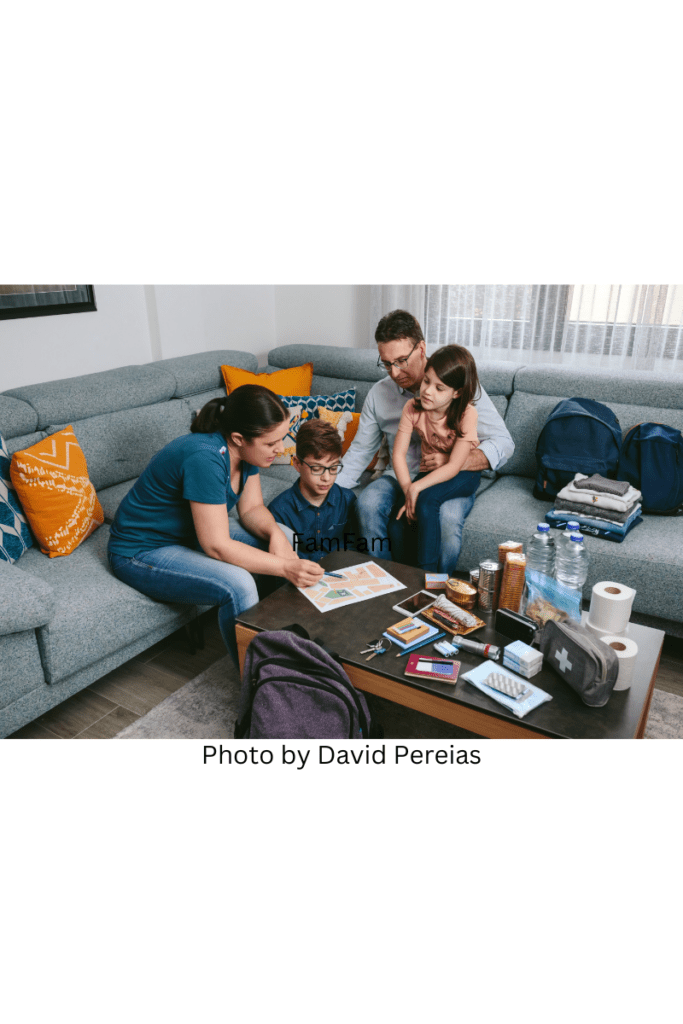In just the first two weeks of May, 784 tornadoes struck somewhere in the United States—making this the second-highest tornado season on record. Startling and scary! And, only one of the many natural disasters people face. Fire, floods, natural gas explosions, and many other situations pose risks for families. Emergency personnel urge parents to implement a disaster plan. What should parents know—and, how can co-parents work together to create a disaster plan?
Be prepared
Planning ahead provides the most protection. No one wants to think about disasters. Yet, when parents prepare responses before disaster comes, this helps everyone get on the same page. Parents can share what they will do and how to communicate with each other. This preparation involves several elements.
Let children know what to do if people get separated
In their own home, each parent should make clear to children what to do if the children become separated from parents or each other. For example, if the home is on fire—make sure children know the quickest route out of the house from whatever room they might be in. Then, designate a place for the family to meet. The tree at the front of the yard, the neighbor’s house, etc.
You will likely need different places based on the situation—i.e. you go outside for fires but to the basement for tornadoes. Because children can be scared by the conversations, turning it into a challenge or game might help.
You can start the conversation with something like, “You know at school when you have tornado or fire drills? We should have those here, too. So, who can think of the best place to run if there was a fire? If you heard the tornado siren?”
As children brainstorm options, this often gives a sense of control, which helps reduce fear. However, if they instead seem to be getting overwhelmed—just give them the answer. “For fires run outside to the mailbox. For tornado sirens run to the bathroom without windows, (if there is no basement).”
Plan for connecting with the other parent
Then, make sure you also have a plan for connecting with the other parent. When the power is out and cell phones are down—communication goes out the window. Panic skyrockets.
Designate a place parents can meet after a tornado or flood to check on children. Where would you go if you couldn’t be home? A hotel? Relative’s house? Shelter? Let the other parent know where you would be so that they can go there if they can’t reach you.
You may also want to share the route you would use to get to your designated place. This helps others know where to start searching if they need.
Finally, designate a person each parent can call to give or check on updates on what is happening. If cell phone coverage is spotty—this backup helps ensure both parents know what is happening with children.
The Red Cross also provides templates for Emergency Contact cards that designate where people will go and who they will contact along with information on doctors, should those be necessary. Filling these out and keeping them in a wallet or backpack provides key information in a bind.
Plan for special circumstances
Pets, children with special needs, or elderly parents may all need additional arrangements in place. Recent tornadoes in Mariette, Oklahoma destroyed the entire town. Think through what factors would be hardest to handle if you lost your house and there were no store or neighbors to go to. How could you mitigate these?
Ideas could include:
- For family members on daily medications or special diets, prepare an emergency bag with a few days’ doses of medications/approved food in case supplies are disrupted.
- What comfort objects would help your children? Keep options in your trunk in case of emergency. Think of things like back-up pacifiers, stuffed animals, blankets, books, and small toys.
- For pets, is there a friend or family-member who can take your pet if you end up in a shelter? Keep a small bag of food in the car for this.
No one wants to think the worst. Yet, over 3 million people were displaced by a natural disaster in 2023. At best, creating a disaster plan means you never have to use it. At worst, it means both parents know how to work together, even from separate homes.
If you would like more information on co-parenting or other issues in divorce, please contact Resolution Mediation by clicking HERE or calling 317-793-0825. We look forward to serving you. As always, the above is for information only. Seek a divorce professional for guidance in your personal situation.



